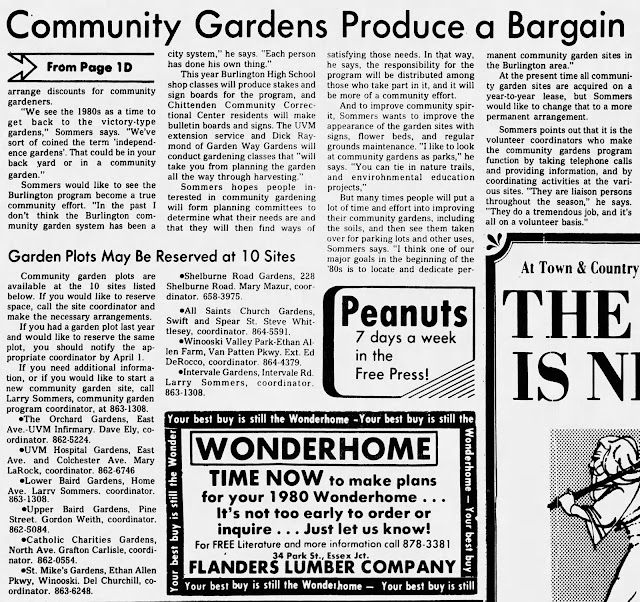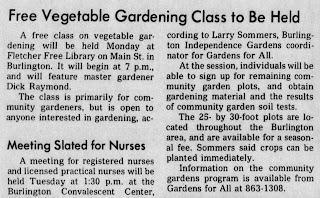BACG History Post #30
Larry Sommers graduated from SUNY New Paltz with a degree in psychology and business. During the mid 1970s, he oversaw community garden development in a six-county region of New York's Hudson Valley. The program grew from one community garden to sixty gardens in six years. He became a skilled organizer helping communities to build alternative food systems.
In the summer of 1979, Sommers and his wife JoAnne Dennee traveled to Vermont to attend the Northeast Organic Farmers Association (NOFA) Conference in Lyndonville. Along the way, the couple stopped at the Gardens for All headquarters in Burlington to say hello. They left a positive impression during the social visit with the GFA staff.
"I got a call out of the blue in September," said Sommers. "Gardens for All offered to fly me from Poughkeepsie to Burlington for an interview. The president, Jack Robinson, picked me up at the airport in a Mercedez Benz."
Robinson shared with Sommers that a major position was opening with Gardens for All. The founding director, Tommy Thompson, was moving to part-time. Sommers was offered the position of community garden coordinator for Burlington and surrounding towns. He would overlap with Thompson, who was focusing on national and international community garden development.
Sommers' first priority focused on strengthening the eleven remaining Gardens for All sites. He developed a three-year plan for the community gardens to become a community-supported effort.
In a March 6, 1980 Burlington Free Press article, Sommers said:
"In the past, I don't think that the Burlington community garden system has been a city system. One of our major goals in the beginning of the '80s is to locate and dedicate permanent community garden sites in the Burlington area."
The strength of community partnerships was reflected in Sommers' approach. He worked with Burlington High School shop students to produce signs and stakes for the gardens. Chittenden Community Correctional Center residents constructed bulletin boards. Improving the appearance of the garden sites was key to boosting community spirit. "I like to look at community gardens as parks," he said.
When Sommers took over coordination of the community garden program, most of the garden sites lacked access to water. Gardeners relied on rainfall and hauled water in the trunks of their cars. Sommers worked to establish water systems at the sites and to support the volunteer site coordinators.
Declining soil fertility had become an issue at some of the older community garden sites. Sommers introduced the idea of setting up composting at garden sites and running composting workshops for gardeners. He worked with the University of Vermont to test the soil at garden sites and develop soil improvement plans.
Sommers led by example. He and his wife JoAnne Dennee served as coordinators for the new community garden site in the Intervale, which began in 1980 with 20 plots. Community garden participants were encouraged to form planning committees to assess the needs at the garden sites and to take responsibility for working together to meet those needs.
Sommers continued the Gardens for All tradition of vegetable gardening classes for community gardeners. Dick Raymond served as the presenter for a free class held at Fletcher Free Library in May, 1980


